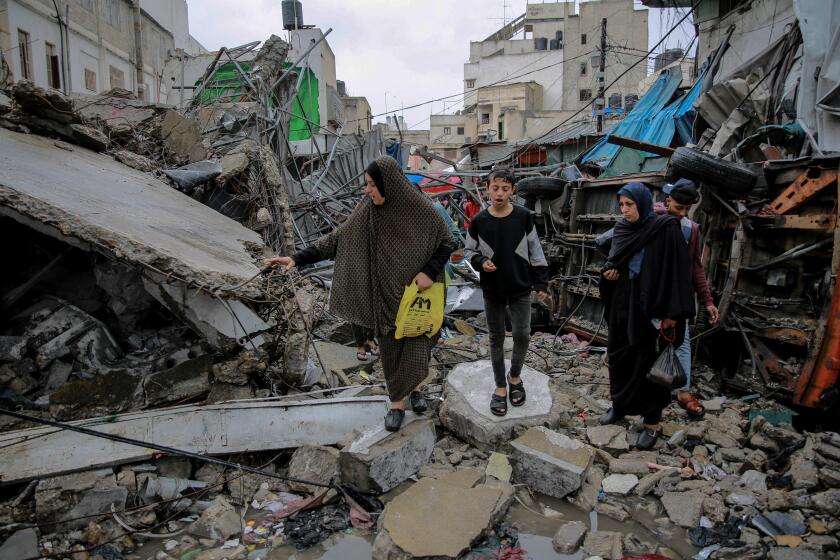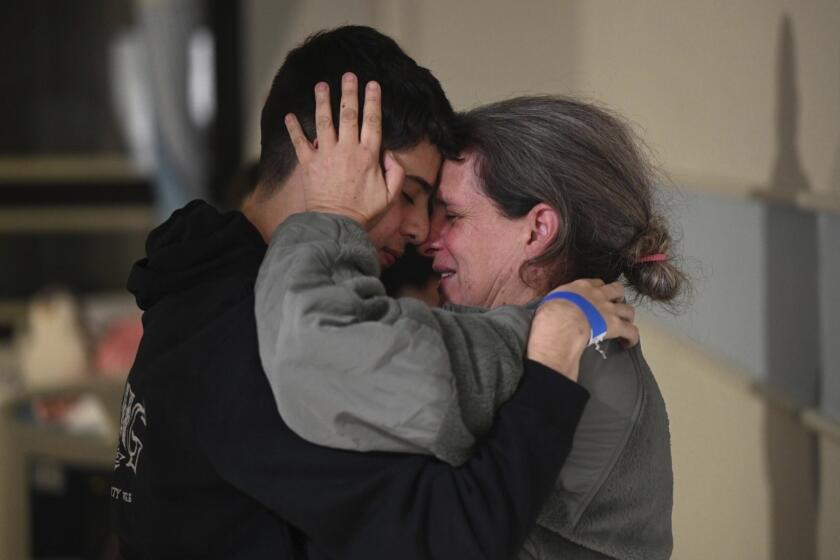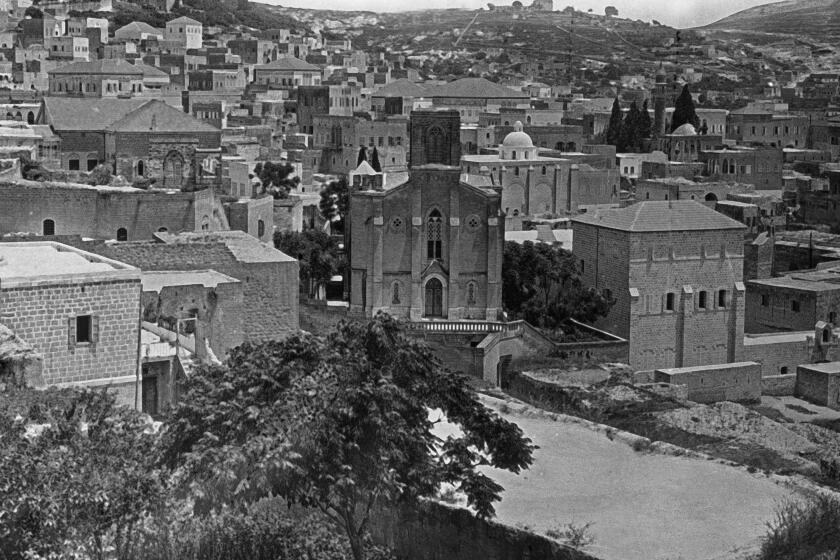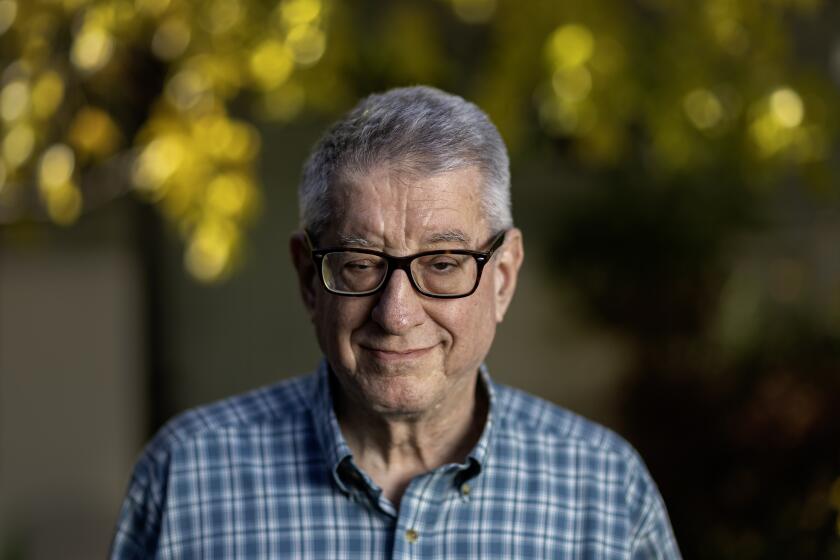The Israel-Hamas truce was in danger of collapsing. Qatar, not the U.S., saved it

- Share via
JERUSALEM — The deal seemed on the verge of unraveling. Hamas had accused Israel of failing to keep its side of the bargain, and Israel was threatening to resume its lethal onslaught on the Gaza Strip.
That was the point at which a Qatari jet landed at Israel’s Ben-Gurion International Airport on Saturday. Negotiators aboard set to work, seeking to save the cease-fire deal between Israel and Gaza’s Hamas rulers before it fell apart and wiped out weeks of high-stakes diplomatic wrangling.
The first public visit by Qatari officials to Israel marked an extraordinary moment for the two countries, which have no official diplomatic relations. It also underscored the major role of the tiny emirate in bridging differences between the enemies.
“This is something we’ve never seen before,” Yoel Guzansky, a senior fellow at the Institute for National Security Studies in Tel Aviv, said of the Qataris’ stay in Israel. “It’s the only external actor in the world with that much leverage on Hamas, because of its many years of support.”
The weekend mission was successful, and most of the team jetted home. But several Qatari mediators stayed behind to work with Israeli intelligence officials on extending the four-day truce, which was originally set to end Tuesday morning, according to a diplomat briefed on the visit who spoke on condition of anonymity because of the sensitivity.
Those efforts apparently paid off, as Qatar’s Foreign Ministry announced that Israel and Hamas had agreed to extend their cease-fire for two more days past Monday, raising the prospects of a longer halt to the war.
Palestinians in the Gaza Strip take note of their losses and stock up on water, food, fuel and other essentials during a pause in fighting.
With its close ties to the United States — it hosts the largest American military base between Europe and Japan — its communication with Israel since 1995 and its support of blockaded Gaza to the tune of what estimates suggest is more than $1 billion since 2014, Qatar is uniquely positioned to break deadlocks in the cease-fire talks, which also involve the U.S. and Egypt.
“We need Qatar,” Guzansky said of Israel, noting that other Arab countries increasingly have interests in Israel and are normalizing their relations. “Qatar is seen as the only player in the Arab world that is loyal to the Palestinian cause.”
The emirate has hosted an overseas Hamas political office since 2012, allowing Qatar to wield some influence over the militant group’s decision-makers. Top Hamas officials, including Hamas political bureau head Khaled Mashaal, live in Qatar.
Qatar says Hamas’ political office in its capital, Doha, came about at the request of U.S. officials who wanted to establish a communication channel, just as Doha had hosted Taliban offices during America’s 20-year war in Afghanistan.
Information about their captivity has been tightly controlled, but family members have begun sharing details of the freed hostages’ experiences.
Qatari officials say they are guided by a desire to reduce conflict, though their ties with a range of Islamist groups, including Hamas, the Muslim Brotherhood in Egypt and the Taliban have drawn criticism from Israel, some U.S. lawmakers and neighboring Arab governments.
“This is soft power on steroids, mobilized for America’s interest,” said Patrick Theros, a former U.S. ambassador to Qatar. “Hosting organizations which the United States cannot be seen talking to is part of this policy.”
The wealthy Gulf Arab state, with a native population of just 300,000, has leveraged its strategic location and tremendous natural gas riches to wield political influence and project soft power around the world, including as host of the 2022 World Cup.
In the Israel-Hamas hostage negotiations, Qatari mediators, joined by those from Egypt and the U.S., faced the task of getting the warring sides to put faith in diplomacy when trust was subzero.
The sadness and bitterness I heard from elderly relatives about the takeover of our homeland conflicted with the lessons my parents tried to instill.
Over the weekend, Hamas complained that Israel had violated the terms of their cease-fire and said the deal was in danger. Only 137 trucks with badly needed humanitarian aid made it through on Friday, the first day of the truce, and 187 on the second day, according to the United Nations’ Palestinian refugee agency. Israel had promised to permit 200 a day.
Qatari officials resorted to face‐to‐face meetings with Israeli officials to try to save the deal, according to the diplomat. A few hours with Mossad officials in Tel Aviv proved crucial Saturday.
Suddenly, the deal was back on. Hamas handed over its second batch of Israeli hostages, families in the West Bank rejoiced over another 39 women and teenagers freed from prison, and Palestinians in Gaza emerged from their shelters to search for fuel and missing family members.
Qatar’s minister of state for international cooperation, Lolwah Khater, became the first foreign official to visit the besieged Gaza Strip on Sunday. She used the pause in fighting to survey the disputed influx of aid, meet wounded Palestinians and talk with Wael Dahdouh, Gaza bureau chief of Qatari-funded Al Jazeera, who lost his wife, son and grandchild in an Israeli airstrike. The pan-Arab broadcaster, which has more cameras in Gaza than any other news outlet, has dominated Arabic coverage of the war.
USC economics professor John Strauss’ remarks about Hamas at a pro-Palestinian protest went viral, igniting debates about censorship, academic freedom and safety.
Despite their differences, both Israel and Hamas have an interest in prolonging calm. Even as bigger questions mount over what happens after the war, a Qatari official who spoke on condition of anonymity because of the sensitivity of ongoing negotiations says his country stays focused on what’s immediately possible, such as maintaining the cease-fire and preventing a regional war that draws in Hamas’ Iranian patrons or Lebanon’s Hezbollah militants.
A steady stream of officials has passed through Doha to that end, including Iran’s foreign minister, Lebanon’s caretaker prime minister and the director of the CIA.
“There is no conflict that began and ended on the battlefield,” Majed Ansari, spokesperson for Qatar’s Foreign Ministry, told the Associated Press on Monday. “Now, as hostages are being released and there are pauses in the fighting, we might be able to find a solution.”
More to Read
Sign up for Essential California
The most important California stories and recommendations in your inbox every morning.
You may occasionally receive promotional content from the Los Angeles Times.














